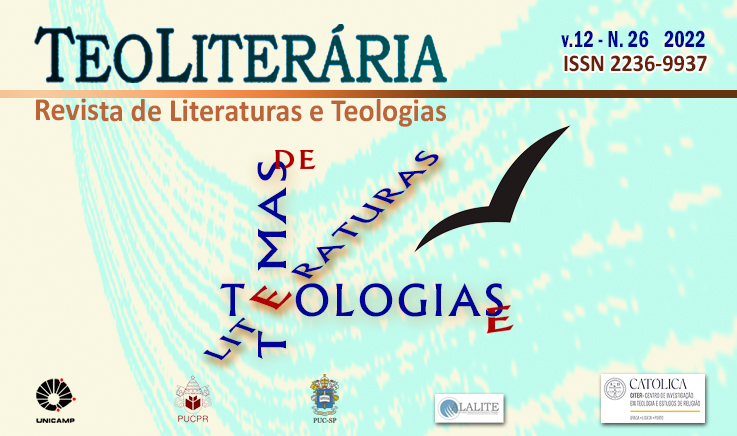O sentido do sacrifício
o mal e a salvação em René Girard
DOI:
https://doi.org/10.23925/2236-9937.2022v26p222-251Palabras clave:
sacrifício, mal, salvação, violência, bode expiatórioResumen
Se Jesus Cristo é o Messias, a redenção ocorreu desde o evento da Paixão e, por isso, não se justifica, em toda a cristandade, a reprodução da violência mimética. Mas se, de fato, o cristianismo é libertador, porque o universo cristão persiste na violência, aliás, para muito além dos limites do próprio ritual sacrificial realizado em diversas sociedades não secularizadas? Qual é a razão da reafirmação dos estereótipos – e da criação de novos estereótipos - e, com isso, da disseminação do preconceito, ambiente no qual o sacrifício cede espaço para a vingança cada vez mais ampliada, que aflui para a generalização? Em linguagem teleológica, por que, apesar da salvação por Jesus Cristo, o mal permanece no mundo? O pensador francês René Girard traz luzes acerca desta temática. A partir de sua obra, e referenciado pelas questões aqui anunciadas, o presente artigo perscruta o esquema do bode expiatório e a interpretação girardiana acerca do mal associado à violência, bem como da salvação, vinculada ao evento histórico da morte de Cristo.
Citas
ARISTÓTELES. Poética. Impressa Nacional Casa da Moeda, Lisboa, 2003.
BENVENISTE, Émile. O vocabulário das instituições indo-européias: Poder, Direito, Religião. Vol. 2. Trad. Denise Bottmann; Eleonora Bottmann. Campinas: Editora da UNICAMP, 1995.
BÍBLIA. Português. Bíblia de Jerusalém. São Paulo: Paulus, 2019.
DURKHEIM, Émile. As formas elementares da vida religiosa: o sistema totêmico na Austrália. São Paulo: Martins Fontes, 1996.
DORNELES, Vanderlei. Mito e acontecimento: as relações entre mitologia nas teorias de Eliade e Girard. São Leopoldo: Estudos Teológicos, 2018.
GIRARD, René. A rota antiga dos homens perversos. Tradução de Tiago José Risi Leme. São Paulo: Paulus, 2009a.
GIRARD, René. A violência e o sagrado. Tradução de Martha Conceição Gambini. São Paulo: Ed. UNESP, 1990.
GIRARD, René. Coisas ocultas desde a fundação do mundo: a revelação destruidora do mecanismo vitimário. Tradução por Martha Gambini. São Paulo: Paz e Terra, 2008a.
GIRARD, René; VATTIMO, Gianni. Cristianismo e Relativismo: verdade ou fé frágil?. Tradução de Antônio Bicarato. Aparecida (SP): Ed. Santuário, 2010.
GIRARD, René; ANTONELLO, Pierpaolo; ROCHA, João Cezar de Castro. Evolução e conversão: diálogos sobre a origem da cultura. Tradução de Bluma Waddington Vilar e Pedro Sette-Câmara. São Paulo: É Realizações, 2011.
GIRARD, René. O bode expiatório. Tradução de Ivo Storniolo. São Paulo: Paulus, 2004.
GIRARD, René. O bode expiatório e Deus. Tradução de Márcio Meruje. Portugal: Covilhã, 2008b.
GIRARD, René. Mentira romântica e verdade romanesca. São Paulo: É Realizações Editora, Livraria e Distribuidora Ltda, 2009b.
GODOY, Edevilson. A revelação na antropologia de René Girard: da mitologia à escatologia. 2019. 316 f. Tese (Doutorado em Ciência da Religião) – Pontifícia Universidade Católica de São Paulo, São Paulo, 2019.
MIGUEL, Maiara Rúbia. O ressentimento e o sagrado em René Girard. 2021. 236 f. Tese (Doutorado em Ciência da Religião) – Universidade Federal de Juiz de Fora, Instituto de Ciências Humanas. Programa de Pós-Graduação em Ciência da Religião, Juiz de Fora (MG), 2021.
Publicado
Cómo citar
Número
Sección
Licencia
Derechos de autor 2022 Teoliteraria - Revista de Literaturas y Teologías (On Line) ISSN 2236-9937

Esta obra está bajo una licencia internacional Creative Commons Atribución 4.0.
La Teoliteraria - Revista Brasileira de Literaturas e Teologías es detentora de los derechos autorales de todos los artículos publicados por ella. La reproducción total de los artículos de ésta revista en otras publicaciones, o para cualquier otro fin, por cualquier medio requiere autorización por escrito del editor de este periódico. Reproducciones parciales de artículos (resúmenes, abstrac, más de 500 palabras de texto, tablas, figuras y otras ilustraciones) deberán tener permiso por escrito del editor y de los autores.

